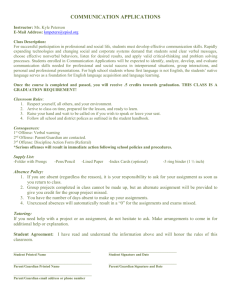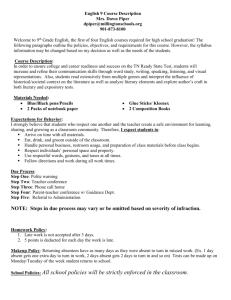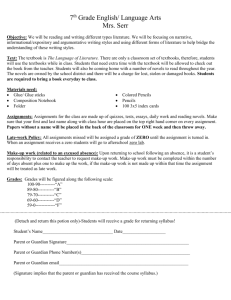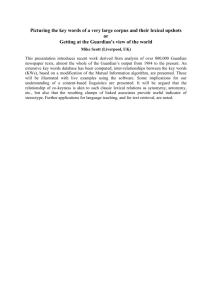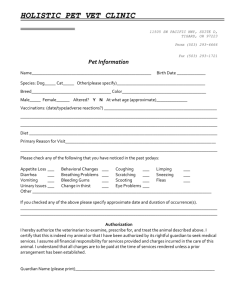Braley US Govt Syllabus 2015-16
advertisement
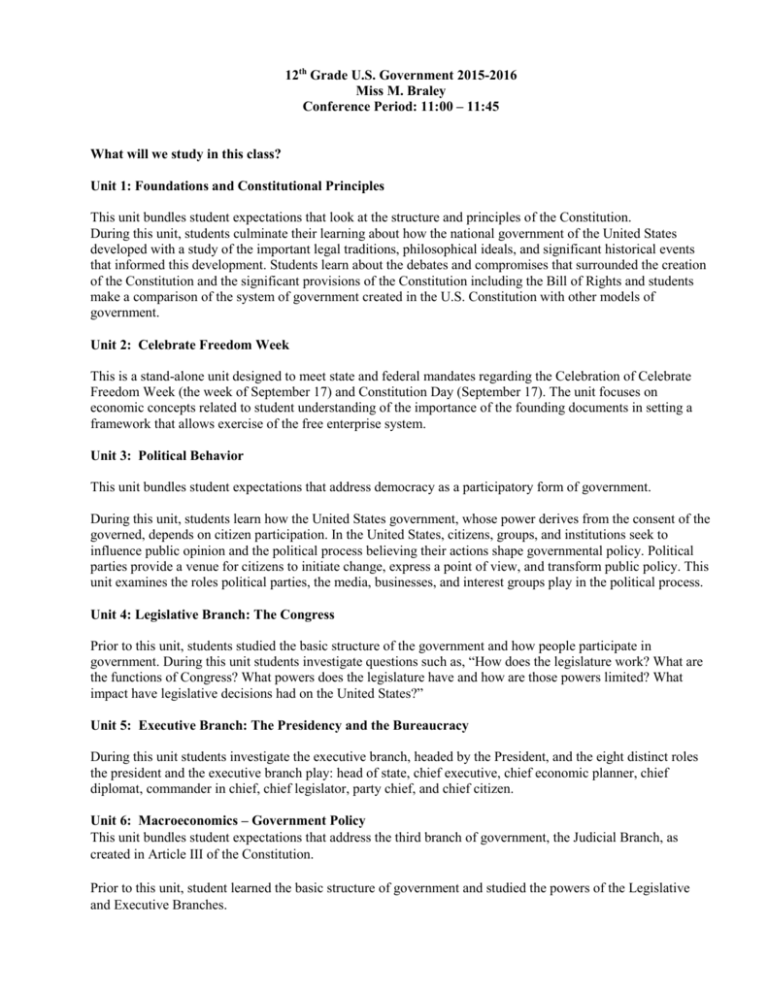
12th Grade U.S. Government 2015-2016 Miss M. Braley Conference Period: 11:00 – 11:45 What will we study in this class? Unit 1: Foundations and Constitutional Principles This unit bundles student expectations that look at the structure and principles of the Constitution. During this unit, students culminate their learning about how the national government of the United States developed with a study of the important legal traditions, philosophical ideals, and significant historical events that informed this development. Students learn about the debates and compromises that surrounded the creation of the Constitution and the significant provisions of the Constitution including the Bill of Rights and students make a comparison of the system of government created in the U.S. Constitution with other models of government. Unit 2: Celebrate Freedom Week This is a stand-alone unit designed to meet state and federal mandates regarding the Celebration of Celebrate Freedom Week (the week of September 17) and Constitution Day (September 17). The unit focuses on economic concepts related to student understanding of the importance of the founding documents in setting a framework that allows exercise of the free enterprise system. Unit 3: Political Behavior This unit bundles student expectations that address democracy as a participatory form of government. During this unit, students learn how the United States government, whose power derives from the consent of the governed, depends on citizen participation. In the United States, citizens, groups, and institutions seek to influence public opinion and the political process believing their actions shape governmental policy. Political parties provide a venue for citizens to initiate change, express a point of view, and transform public policy. This unit examines the roles political parties, the media, businesses, and interest groups play in the political process. Unit 4: Legislative Branch: The Congress Prior to this unit, students studied the basic structure of the government and how people participate in government. During this unit students investigate questions such as, “How does the legislature work? What are the functions of Congress? What powers does the legislature have and how are those powers limited? What impact have legislative decisions had on the United States?” Unit 5: Executive Branch: The Presidency and the Bureaucracy During this unit students investigate the executive branch, headed by the President, and the eight distinct roles the president and the executive branch play: head of state, chief executive, chief economic planner, chief diplomat, commander in chief, chief legislator, party chief, and chief citizen. Unit 6: Macroeconomics – Government Policy This unit bundles student expectations that address the third branch of government, the Judicial Branch, as created in Article III of the Constitution. Prior to this unit, student learned the basic structure of government and studied the powers of the Legislative and Executive Branches. During this unit students gain an understanding of the U.S. court system and how it functions to protect minority viewpoints and individual rights. Unit 7: Macroeconomics – Money, Banking, and Federal Reserve This unit bundles student expectations that address money and the banking system, including the Federal Reserve system and monetary policy. During this unit students learn about the banking system and Federal Reserve and analyze the effects of monetary policy on the nation’s supply of money. They describe the functions and characteristics of money and differentiate the different types of money or sources of value of money including commodity, representative, and fiat money and compare and contrast the positive and negative aspects of barter, currency, debit cards and credit cards. Students describe the structure and functions of the Federal Reserve System and analyze how the Federal Reserve uses the tools of reserve requirement, discount rate, and open market operations. Students examine the federal funds rate and understand that the Federal Reserve targets the federal funds rate. What am I expected to bring to class each day? Class Notebook (This is a three-ring binder with loose-leaf paper and divided into four sections.) Students are responsible for having this syllabus in their notebooks, complete with parent and student signatures. Pens (blue or black ink only), Map Pencils. Complete assignments and/or make up work. A positive attitude. How will I be graded in this class? GRADING GUIDELINES: • 12 daily grades per grading period (1-2 per week) • 3 major grades per grading period (tests and projects) • 9-week grade is calculated by averaging 50% of all major grades and 50% of all daily grades. Student may re-test once if first test score is below 70. The highest grade a student may earn in gradebook on a re-test is a 70. MAKE-UP WORK: Student will have one day per each day absent to complete and turn in any make-up work including daily and major grades. Student is responsible for making arrangements to come before or stay after school as necessary. LATE-WORK POLICY: All work must be turned in on time. An assignment turned in one day late will receive a grade of 70, and an assignment turned in two days late will receive a 50. Later assignments will not be accepted. TUTORING: I am available for tutoring every Wednesday afternoon until 3:30. Please e-mail me if other arrangements need to be made. Absent Work: If a student is absent they have one day for each day absent to turn in their work. Please Note: If you are absent, it is your responsibility to complete make-up assignments in a reasonable amount of time. It is also your responsibility to obtain make-up work from the Falcon agenda folder during non-class time. What are the expectations for behavior in this class? Of course, students are required to follow all school policies, as listed in the Student Handbook. While in this classroom, you are also expected to adhere to the following guidelines: Respect yourself (be on time, prepared, accept responsibility, set high goals). Respect others (be courteous, be helpful, accept differences). Respect and care for the room, the class materials, and the property of others. Do any class assignments to the best of your ability. If the student does not meet expected classroom behavior, he/she will face swift and consistent consequences. These consequences may vary, based upon school policy, severity of behavior, and/or student's intent. Typical consequences include: Verbal corrections Conference with student Conference with parent/guardian (by phone, email or in-person) Detention Office referral It is my pleasure to work with you this year. If you have any questions or concerns, I can be reached by calling the main office (281) 324-1845 and leaving a message with the secretary, or you may email me at: mbraley@huffmanisd.net. I want our year together in Social Studies to be a successful one. Sincerely, Miss Braley Parent/Guardian Acknowledgment I have reviewed these guidelines with my son/daughter and will help him/her meet the expectations and abide by the responsibilities in any way I can. _______________________________________________ Parent/Guardian signature Student Acknowledgment I have read these guidelines and understand my responsibilities as a student in Miss Braley’s class. _______________________________________________ Student signature It is very important that I am able to reach you during the school year. Please print the following information and return to school with your child (a homework grade for returning this paper). Student Name: _______________________________________ Parent/Guardian Name: _________________________________ Home Phone #_____________________________ Cell Phone # _________________________ Work Phone #______________________________ When is the most convenient time to call? __________________________________ Address: __________________________________________________________________________ Parent/Guardian Email Address: ________________________________________________________ Please describe any special concerns you have for your child (Optional): By signing below, we agree to work together (teacher, parent, and student) to do everything possible to achieve success in the classroom. Parent/Guardian Communication and Support Form ___ Miss Braley ___ Parent/Guardian _____ Student Thank you for completing this form. The information you provided will allow us to communicate throughout the year about your child's progress.
